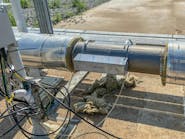The National Science Foundation (www.nsf.gov) enlisted two University of Central Florida (www.ucf.edu) researchers to develop a water purification system to aid victims of Hurricane Katrina and other disasters.
The professors were awarded a $10,000 startup grant from NSF this month as part of a rapid response program designed to support research that can directly benefit those affected by Katrina. The researchers will submit their research results to NSF in six months. The agency is also encouraging the scientists to connect with the Federal Emergency Management Agency and other agencies directly tied to disaster relief for immediate application of any useable technology.
Professors Sudipta Seal from the Department of Mechanical, Materials and Aerospace Engineering and James Taylor from Civil and Environmental Engineering combined their expertise in developing coated nanoparticles and water purification systems, respectively, to propose a portable method for producing safe drinking water from any source.
The key to the process is a naturally created nanoparticle that can kill bacteria that foul membranes used as filters to produce drinking water. In catastrophic situations such as Hurricane Katrina or the recent earthquake in Pakistan, the membranes become so fouled by bacteria that they become unusable for water treatment.
“By introducing nanoparticles into a mobile integrated membrane system, we can create potable water from a variety of sources,” said Seal in a prepared statement
With the seed funding, the researchers hope to develop an adaptable method for producing quality water in any kind of emergency.
— Flow Control Staff

